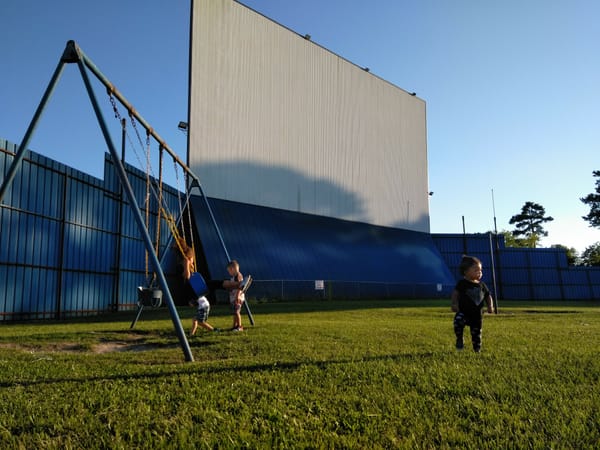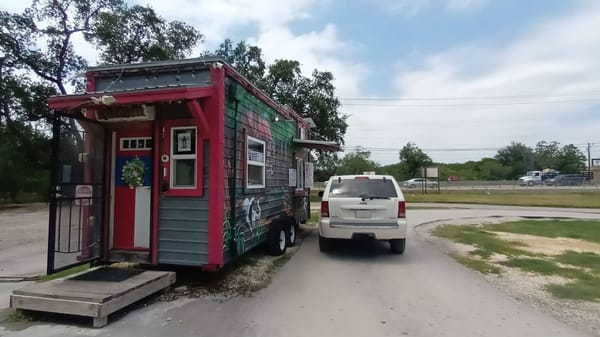The 10 Best Rural Internet Providers in Texas You Need To Know About
I put together this list of the 10 best rural internet providers in Texas so that I could continue working from home without any issues.

I recently moved into a rural area of Texas, which is a huge change for a guy who grew up in cities with millions of people. And because I work from home, I had to quickly find the best, fastest, and most reliable rural internet providers in Texas so that I could continue working from home without any issues.
Here are the best rural internet providers in Texas
Surprisingly, there are almost more unlimited rural internet options available than there are to people in cities.
Weird, I know.
I will break down the upsides and downsides of each of the rural internet providers below, along with what I was looking for from each provider to ensure that I had the fastest, most reliable, and well-rounded internet service I could find.
I will also discuss some new and exciting players that are jumping into the rural internet space towards the end of this article. The future of rural internet is almost here, and these key internet providers will be creating significant changes.
While I have played around with and tested many rural internet services, these are the internet service providers that I ended up the listing as my top ten:
- OliveIP (anywhere you have a mobile data signal)
- WacoWiFi (Waco & Surrounding Areas)
- NextLink
- Heritage Broadband
- RISE Broadband
- Satellite Internet (ViaSat & HughesNet)
- T-Mobile Home Internet
- NEW! Verizon 5G Home Internet
- Starlink Internet
Here's how the 10 best rural internet providers line up
Let's get down to business and discuss the pros and cons of each of the rural internet service providers in the list below. I will start with the ones that I prefer the least (based primarily on coverage area and/or speed), and move up to the ones that I recommend the most.
ExpertTexan.com participates in affiliate programs. Any links provided in the text below may be affiliate links that we benefit from financially. Please use our links as they help us to be able to continue providing you with quality content - free of charge.
Satellite Internet
There are two three main satellite internet providers:
- ViaSat
- HughesNet
- (NEW) Starlink
Coverage area
- Available just about anywhere in the world
If you live out in the middle of nowhere, and even your smartphone does not have a data signal of any kind, then you may have to settle for a satellite-based internet provider.

This is a worst-case scenario and I only recommend going with satellite internet if you are absolutely out of all of the other internet provider options that we discuss below.
Why?
Because, while satellite internet has been a blessing for many people over the past decade or two who did not have any other rural internet options available, there are serious drawbacks to satellite internet service as it exists today:
Throttling
Any time you read the word "unlimited" in terms of data, you also need to look for words like "no throttling", "data caps" or anything else related to the speed of your internet being slowed down.
When it comes to satellite internet options, the plans from both ViaSat and HughesNet had data limitations and throttling included in their verbiage.
What does that mean?
The means that even on an "unlimited data plan", once you use a certain amount of data (usually 50 GB or less) in any given billing period, they slow your speeds down. And I'm not talking about 3G speeds or even 2G.
They will throttle your speeds down to dial-up era speeds. Yeah, it's that bad.
If you work from home, have kids doing school from home, stream content, etc., then satellite internet probably isn't the best internet option for you based on the throttling factor alone.
In 2022, it does not take much internet activity to reach a 50GB threshold, or even a 100GB threshold to trigger throttling with either of these satellite internet companies.
For reference, a 4K video being streamed to your TV can eat up over 7GB's per hour. It would take you approximately 7 hours of 4K video streaming to hit your 50GB limit which would trigger throttling on at least one (or more) of their service plans.
Not cool.
If you work from home, have kids doing school from home, stream content, etc., then satellite internet probably isn't the best option for you based on the throttling factor alone.
Weather
Despite the improvements in satellite technology over the years, the weather is still a serious problem for satellite-based internet or tv services.
I currently have Direct TV (no other live tv options in my area) and I experience these outages every time there's a rainstorm. Although a heavy cloud cover typically does not cause complete interruption, a rainstorm absolutely does, so if you work from home like me, that's an automatic no-go.
No matter where you are... you have internet options.
LEARN MORE
Rainstorms here in Texas can last hours (even all day sometimes) which means I would have to stop working for extended periods of time (could be an entire day), which in turn makes me unreliable in the services that I get paid for.
Contracts
While some people may not mind signing a contract, I personally avoid signing contracts whenever possible. I avoid contracts because if I have a negative experience and the level of service takes a dive, or I continue to have repeat issues that they cannot resolve, it's extremely difficult or expensive to get out of the contract.
In the case of satellite internet, nearly every service plan requires that you sign some kind of contract, and yes, the cancellation fees to get out of the contract are pricey.

For instance, with ViaSat, they require a 24-month contract. If you want to cancel services, you have to pay the equivalent of $15/mo for every month remaining on your contract.
They do offer a Month-to-Month service plan, but you're required to pay a "no contract fee" of $300 on your first bill to enjoy that luxury.
So no matter what way you look at it, you are paying a cancellation fee of some kind.
Cost
While rural internet is inherently expensive simply because of the infrastructure required to get services to the middle of nowhere for a limited number of people, satellite internet is even more expensive than many of the options that we'll discuss below.
When I was looking at ViaSat pricing, their "Unlimited Data" plan was $150/month.
The rest of the non-satellite based internet service providers discussed in this article generally do not approach anywhere near the $150/month mark, so that alone is a significant negative for me.
Not only is that the most expensive price for rural internet providers in Texas, but that price STILL includes throttling once you exceed 100GB's in any given billing period.
Gaming & VPN's
It's almost impossible to play any online based games using satellite internet. If you're a FPS (First Person Shooter) fan who likes to play with other gamers online, forget about it.
VPN's typically struggle with satellite based services as well. So if you're a security and privacy minded internet user, you'll want to look for something else.
Final Take
For the reasons listed above, satellite is good when no other option is available - with the exception of Starlink internet (more on that in a second).
If there are any alternative options in your area, even the ability to use a hotspot on your mobile phone and pay as you go for data, I'd probably go that route instead of satellite if Starlink is not yet available in your area.
However, the minute that Starlink is an option, I would recommend switching to it immediately.
Since Elon Musk is completely changing the competitive landscape for satellite internet, I fully expect that the other satellite internet providers will also have to become much more competitive in due time.
I will keep this page updated as that plays out.
Starlink Internet
And then there's Starlink internet - Elon Musk's attempt to make highspeed internet access available world-wide, even in the most remote regions of the world.
As far as rural internet providers go, Starlink will quite likely become one of the most dominant rural internet providers in Texas - and around the world.
While it's reported that the weather still affects Starlink internet service, pretty much none of the other things that make satellite internet an unattractive option are true about Starlink.
Including latency.
People are already reporting latency rates of less than 20ms. That is outstanding for satellite internet!
To communicate online, stream content and play online multiplayer based games, it's typically recommended that your internet service have less than 100ms latency - the lower your latency, the better.
Since Starlink is currently ranging from 20-40ms, that means gaming and streaming are very much possible on Starlink services if you're able to get that kind of latency in your region.
Not to mention, people are reporting speeds in excess of 200mbps download, and up to 100mbps upload.
Have a cell phone signal? You can probably get high-speed internet.
GET ISP MINT INTERNET
All in all, Starlink is rapidly changing what we typically think of when we hear the term "rural internet".
So far, Starlink satellite internet reportedly offers:
- No contracts
- No termination fees
- No data limits
- No throttling
- Low latency
- Still affected by bad weather (reportedly)
Unfortunately, Starlink is not yet available everywhere. You can check your address to see if Starlink is available for you.
If it's not, don't worry, I expect that it will be soon.
Though, the last time I checked, there was a nearly two-year waitlist just to get your Starlink equipment delivered after placing your deposit. So, we might all be waiting a while for this one.
I guess it's true. Rome really wasn't built in a day.
T-Mobile Home Internet (5G Unlimited)
A while back, T-Mobile canceled a lot of their third-party ISP services for companies who provide rural internet services because they were planning to launch their own home-based internet plans.
T-Mobile has officially launched their home-based internet service and their home internet service network is rapidly growing, including in rural areas.
It has not rolled out in all markets, but you can check here to see if T-Mobile Home Internet service is available in your area.
Given that their cell-phone data service is available in quite a few rural areas around the country, I imagine that before long, so will their home-based internet service.
By all accounts, it's a fantastic service with a flat rate ($50 per month with taxes and fees all included), low latency, and consistent service.
If you live in a rural area and T-Mobile Home Internet service is available, then I'd highly recommend testing it out.

Worth Noting: If you have T-Mobile data on your mobile phone, then chances are, the home internet may also work at your house despite the fact that it is not a "confirmed" address on their service map.
How so?
Because there have been plenty of people on Reddit and elsewhere who have confirmed that their address wasn't in the confirmed "service area", but they purchased the service anyway.
And, it worked at their house just fine.
So, for $50 per month - it's worth a try if you have limited rural internet options!
As of July 2022 - well over a year after rolling out the new home-based internet service - T-Mobile still does not offer it in my area! Once I have had a chance to learn more about the service and test it myself, I will update this article with all of the details.
Verizon 5G Home Internet
Once companies like Starlink started to revolutionize access to the internet across the world, including rural America, it was only a matter of time before the other major players started getting involved.

It started with T-Mobile, and now Verizon has tossed their hat into the mix at half the cost of T-Mobile's home internet service (assuming you already have a Verizon phone plan), at just $25/month with auto-pay enabled.
Check Your Address for Verizon 5G Home Internet
Chances are, if you have a Verizon data signal at your house, you can probably get their home internet service for as little as $25 per month.
RISE Broadband
RISE Broadband is a "Line-of-Sight" wireless internet service provider that primarily services rural areas of the country. That means that you need to be within the line of sight of one of their antennas in order to use their internet service.
Coverage area
- RISE Broadband is a rural internet provider in 16 states, including Texas
The Good
They provide internet services in rural areas that have limited internet options and they do not price gouge their customers (although, in many areas where they have little to no competition, they certainly could).
Their speeds are consistent, the service does not experience interruptions based on weather, and they offer business plans for those who work from home for even faster and more reliable services.
The Bad
Because it is a line-of-sight antenna based service, you may be in their coverage area, but if that 50-year-old oak tree in your yard is blocking the view from your house to their antenna, sadly, you would not be able to get their service.
Unless you want to cut down the oak tree, you'll have to find another option.
I am also unable to get their service where I live, even though my next-door neighbor has it. Why? Because my neighbor lives on a hill (just slightly higher than the one that my house sits on) that barely provides them with a line-of-sight to the antenna.
Likewise, if you have a line of sight, but then someone builds a massive house directly between you and the antenna... Yep, you guessed it! No more internet.
Other than that, there are not many bad things about RISE Broadband.
My neighbors have been very happy with their service for the past 2+ years.
Speeds & Pricing
Like most internet services, RISE Broadband bases their pricing on the speed that you need. One of their top tier plans (20 mbps) will run you somewhere in the neighborhood of $70 - $80 while the slowest one (5 mbps) typically starts from $40 - $50.
Gaming & VPN's
You can use VPN's, play games, etc, when you're on a good RISE Broadband connection.
My next-door neighbor plays online multiplayer games, stream movies, works from home, etc without any issues.
Final Take
I would rate RISE Broadband as a solid B on a scale of A to F. When you take into consideration the number of plans available, the reliability, and pricing, it's definitely a good option.
Overall, it is one of the better rural internet providers in Texas.
Heritage Broadband
Coverage area
- Central Texas: Primarily available in small, rural towns on the northern outskirts of Austin, TX (e.g. Georgetown, Jarrell, Florence, etc.)
Weather
Heritage Broadband is a fixed wireless service which is not affected by heavy rains or bad weather. You will have reliable internet service all year round, just as if you had a fiber line run straight to your house.
Limited options for internet in your area? Try ISP Mint.
LEARN MORE
Throttling
This rural internet provider does not throttle your data. It is truly "unlimited" with no data caps and no throttling.
Contracts
Heritage Broadband does not require any contracts which is a huge A+ in my book.
That usually is a pretty good indicator that a company is confident in their service and are convinced that their customers will stick around for quite some time without requiring a contract to arbitrarily prevent or discourage them from leaving.
Cost
Heritage Broadband cost ranges based on your proximity to their service locations, but their prices generally start well under $100. They offer both personal and commercial internet plans, so which one you ultimately purchase will also determine your final cost.
Gaming & VPN's
With speeds up to 100 Mbps on residential (up to 1GB on commercial), your speeds will be more than adequate for online gaming, streaming videos, jumping on video calls, etc.
VPN's are also good to go on Heritage Broadband.
Final Take
While their internet services are currently limited to a very small rural area of Central Texas, they are a rapidly growing internet service provider.
Due to the technology behind this rural internet provider in Texas, the speeds they offer, the reasonable pricing, their level of support, and the sheer number of people who have nothing but good things to say about this service, I recommend using Heritage Broadband if you are in their service area.
NextLink
Coverage area
- Texas, Oklahoma, Kansas, and Nebraska, Iowa and Illinois.
Weather
NextLink internet service is not affected by bad weather. Rain or shine, you're good to go!
Throttling
NextLink does not throttle your data, regardless of how much data you use in any given month.
Contracts
You can pay a $250 installation fee if you do not want a contract. If you want a cheaper install ($100), then you'll need to sign a 12 month agreement.
Cost
Each of their plans are reasonably priced. Depending on which plan you need, their pricing ranges from $50 - $170 per month.
The cost to get services setup can be a little hefty when you go with smaller companies like NextLink. With a $100 - $250 installation fee, you'll definitely be spending a little bit of money up front but in terms of the monthly recurring cost, it's absolutely reasonable for high speed rural internet.
Gaming & VPN's
As long as you get a fast enough plan (probably their 25 mbps one, or faster), then yes, Nextlink is good for gaming online, streaming videos, etc.
VPN's are good to go on NextLink.
Final Take
Finding quality rural internet providers in Texas can be a tough task. If you are lucky enough to live in a zone that is covered by NextLink, then you should probably get hooked up on one of their internet plans.
The only time this would be a toss-up decision for me is if you live in an area where both NextLink and Heritage Broadband both provide rural internet services. In that case, I would be hard-pressed to go with Heritage because even on their top tier plan, they are cheaper than NextLink by about $40/month.
Note: Tell them "Chris Fluegge" referred you to NextLink to take advantage of the latest referral promotions they routinely offer!
OliveIP
Coverage area
- Anywhere you have a cell phone data signal from AT&T, T-Mobile/Sprint or Verizon
If you have a data signal at your house from either AT&T or T-Mobile/Sprint, or Verizon, then chances are, you can get connected on an OliveIP internet service plan.
It's a fantastic option for those of us living out in the middle of nowhere. It's also super easy to set up with no need to run any complicated wiring or sophisticated installations. Pretty much anybody can set it up on their own.
Rural internet plans for even the most remote areas.
LEARN MORE
Weather
OliveIP is not affected by weather. I have personally used OliveIP in many heavy Texas storms and not once have I experienced any kind of outage.
Throttling
OliveIP offers a variety of rural internet plan options for different types of users.
The plans range from data limits of 500 GB all the way up to 850 GB which, frankly, will cover most rural internet users unless you're streaming 7K videos all day.
Depending on the plan you sign up for, there may be conditions that cause throttling (e.g. abusive usage of the network), but this should not be a regular occurrence.
You can always talk with an OliveIP representative prior to selecting a plan to make sure it's a good fit for your specific use case.
Contracts
OliveIP does not offer any contract-based service plans. Everything is month to month which is convenient.
Cost
OliveIP internet keeps things very simple.

OliveIP generally offers three core plans based on whichever network you can get the best data signal from. Each plan is slightly different, with the main difference being the provider network that you will be connected with (e.g. AT&T vs T-Mobile vs Verizon).
The plan "colors" may change based on what internet services the major networks are currently offering through OliveIP's plans. So depending on what changes have taken place since this article was written, pink, blue and red may not be the plan colors available.
For the latest plans and pricing, you can call OliveIP at (254) 777-5222. I was able to reach out to OliveIP to get exclusive promotions for ExpertTexan readers, so remember to mention the code "EXPERT" to get the latest exclusive discounts that may be available to you.
If you have questions about the various plans, and aren't sure which one to sign up for, the team at OliveIP is happy to chat with you.
Mention discount code "EXPERT" to get your exclusive promotions at OliveIP.
It's a rural internet company with very down to earth people whom I've had the pleasure of meeting in person. They have always been immensely helpful every time I've ever spoken with them.
OliveIP Email: info@oliveip.com
OliveIP Phone: (254) 777-5222
Gaming & VPN's
VPN's will work on OliveIP's service. However, gaming is going to depend entirely on what kind of speeds - and latency - you are able to get at your location.
If your smart phone is getting blazing fast 4G or even 5G internet, then chances are, so will your OliveIP internet. In that case, you may be able to play online gaming without any issues.
Final Take
If you do not have access to Heritage Broadband, NextLink, or RISE Broadband, then I highly recommend going with OliveIP. It is definitely one of the better rural internet providers in Texas (or anywhere you have a mobile data signal).
The more cell phone towers that are installed and upgraded around the US, hopefully, more rural internet service providers (like OliveIP) begin to surface in Texas as an alternative to satellite-based internet.
A quick recap

Each of the companies above has different service areas. Satellite is the one with the most significant coverage (pretty much anywhere), and WacoWiFi probably has the smallest coverage area (though, they seem to be expanding their coverage rather quickly).
If you live in rural Central Texas, then you should be able to get connected with one of the internet providers listed above.
Here is a quick recap on the internet service providers listed above.
- OliveIP: This is my top recommendation if your only other option is satellite, dial-up, or DSL. If you have a data signal from AT&T or T-Mobile/Sprint, then chances are, you can get it.
- WacoWiFi: If you are looking for the best internet options in Waco or rural areas nearby, WacoWiFi is a great option assuming NextLink is not available for you.
- NextLink: My top recommendation if you are not in Heritage Broadband's service area. Please use my name as your referral if you sign up for Nextlink!
- Heritage Broadband: My top recommendation above all other options if you are in their service area. I would go with Heritage even if I could get a traditional wired service like Suddenlink.
- RISE Broadband: RISE is definitely a close recommendation to NextLink if you have both options available.
- Satellite Internet (ViaSat & HughesNet): This is a great service to have if you have absolutely no other options. But the minute that StarLink (see below) satellite internet is live in your area, you should probably jump ship.
- Starlink Internet: This is a fantastic satellite internet service if it's available in your area. Aside from bad weather interrupting your service, Starlink may even compete (performance-wise) with the more traditional internet service providers in your area.
Rural Internet Search Engine for Texas
If none of the internet service providers listed above are available at your address, you may have some luck with this Texas state-based rural internet search engine.
Simply agree to the terms of use for the tool, and enter your location to see which rural internet providers are available for your address:
The future of rural internet providers in Texas
While this list of rural internet providers in Texas may seem a little small, there are some major players that are working towards addressing the need for high-speed rural internet options all across the United States.
The 2020 Pandemic (COVID-19) exposed a significant number of people living in under-served communities across the US where families do not have adequate access to high-speed internet.
As schools and universities remained closed (or only partially opened), many students were left scrambling to make sure that they could attend classes remotely.
That proved far more difficult than previously thought because of the sheer number of students living in areas without access to high-quality rural internet service providers, including Texas.
As a result, people like Jeff Bezos, Mark Zuckerberg, and Elon Musk are all investing heavily in rural internet startups.
Elon Musk's "StarLink" is an internet startup company that already has 1,500+ satellites in orbit. They are currently testing and improving their low-latency satellite internet services and have already launched services in various regions across the United States.
If StarLink is successful (by all accounts, it certainly looks like it already is), it will likely revolutionize rural internet access around the world much quicker than we may have anticipated.
Additional resources
- (2023) Texas Broadband Development Office Hosting Regional Meetings in Texas for Internet Access Feedback & Input From Public Through August 16th, 2023
- Texas - 2022 Broadband Plan Summary
- View a map of all broadband coverage in the state of Texas
- The Governor of Texas signs a bill into law expanding internet access through existing utility provider easements.
- (2022) Starlink to receive $877 million from FCC to improve internet access for rural areas.
- (2022) SpaceX continues to launch Starlink internet-service satellites into space in 2022
- (2022) Starlink updates their wait times for new customer sign-ups.




